
She works at the intersection of biography and history, focusing on post-plantation economies by engaging with a particular landscape on Barbados.

Reading the Plantation Landscape of Barbados: Kamau Brathwaite’s The Namsetoura Papers and Annalee Davis’s This Ground Beneath My Feet: A Chorus of Bush in Rab Lands
and I bent down
listening to the land
and all I heard was tongueless whispering
as if some buried slave wanted to speak again
—Martin Carter
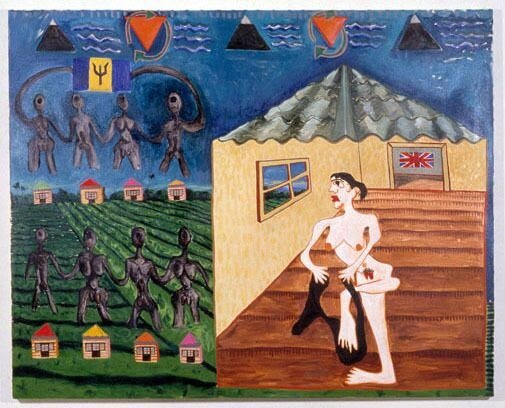
Annalee Davis Uses Art to Unearth and Interrogate
For Annalee Davis, the land, especially the island of Barbados, is often a baseline issue in her work; as are issues of race, class and gender. This might be so because she was born into a large white creole family of five children on a sugar cane estate in Barbados.

Annalee Davis’ (bush) Tea Services: Botanical Inheritances
Janice Cheddie shares a review of ‘(bush) Tea Services’, an installation and performance piece by Barbadian artist Annalee Davis. The project, which explores the multi-layered and complex history of the plantation in the Caribbean, took place in July/August 2016 as part of the temporary Empire Remains Shop in London, curated by artists and curators Cooking Sections. Read her article exclusively on ARC below:
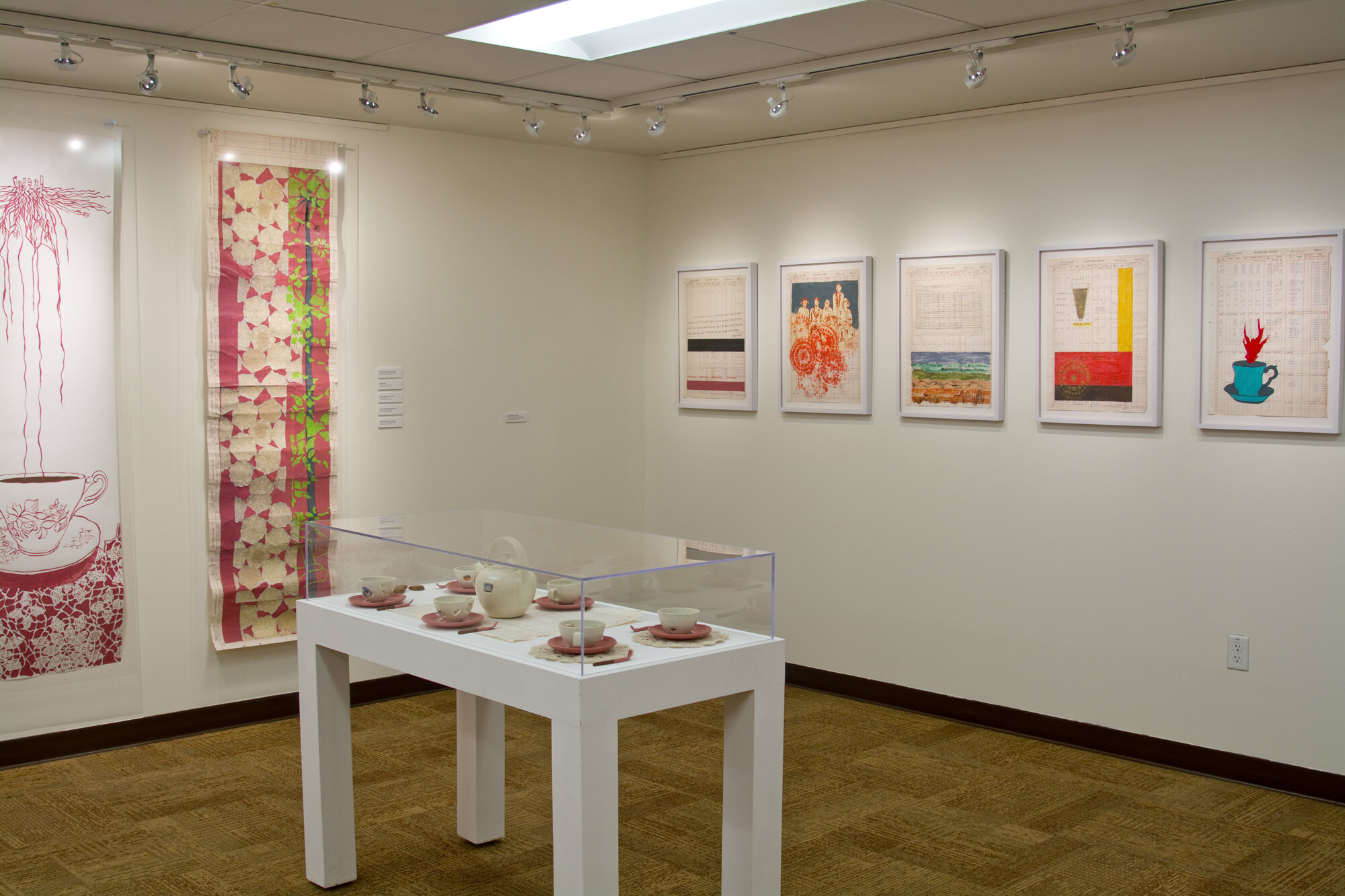
This Ground Beneath My Feet – A Chorus of Bush in Rab Lands
Solo Exhibition | This Ground Beneath My Feet - A Chorus of Bush in Rab Lands, The Idea Lab, The Warfield Center, The University of Texas, Austin, USA. Curated by Holly Bynoe. September - December 2016 - February 2017

Champagne Tastes And Mauby Pockets?
We had wanted something more than what the plantation had enabled, and we had wanted to make the road by walking even though we made lots of mistakes along the way.
(Honor Ford-Smith, 2015)

The Dark Domain
Sweeping the Fields is an act of remembering and of cleansing; a contemporary gesture to history's groan which acknowledge the possibility of an emerging post-plantation apothecary. The action of sweeping, documented through a suite of photographs, developed out of my walking the fields on Walkers Dairy farm in Barbados, where I live and work.

Archipelagic Affinities in an Ocean of Shifting Tides
“In its first three years, the Davidoff Art Initiative program has embraced the regional network of Caribbean artists and provided new opportunities for those committed to Caribbean art to come together and develop their work.”
–caryl* ivrisse crochemar
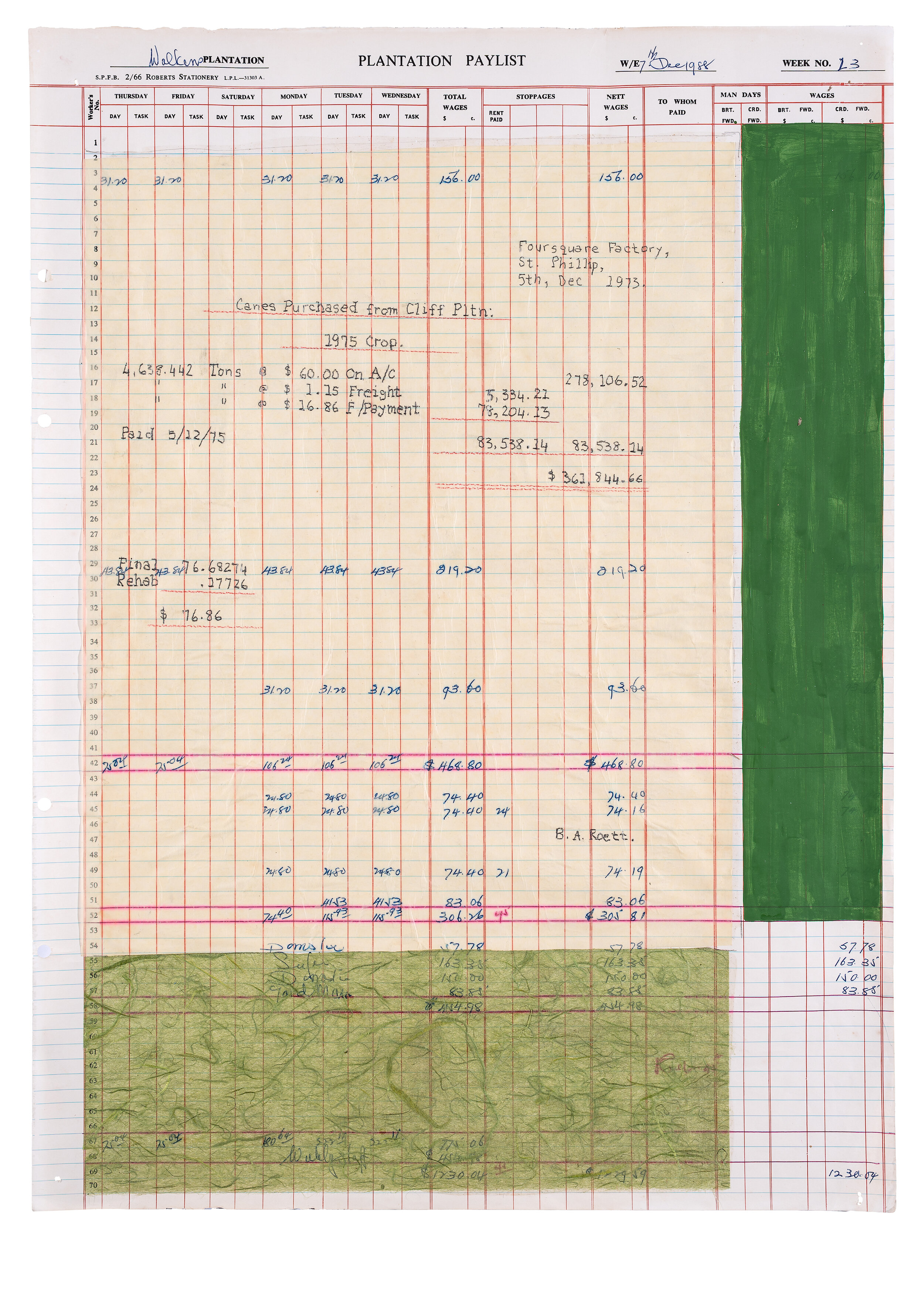
Ledger Drawings
The substrate for these drawings is the plantation ledger page. Countering the conventional daily logging of economic plantation activity, I inscribe other images offering alternative ways of reading the site where I live and work. My attempt to decolonise the ledger by repopulating and complicating these ledgers is a kind of civic negotiation, exposing gaps in Barbados’ plantation history buried in the soil, in the public imaginary and inadequately documented in the archives.

Wild Plant Series
This 2016 series of drawings functions as graphic interventions into 1970s ledger pages, the substrate designed to log economic activity on the plantation. Data entered into ledger pages comprised registering wages, field activity and rent rolls as well as measuring rainfall and the signing out of agricultural implements to plantation labourers.
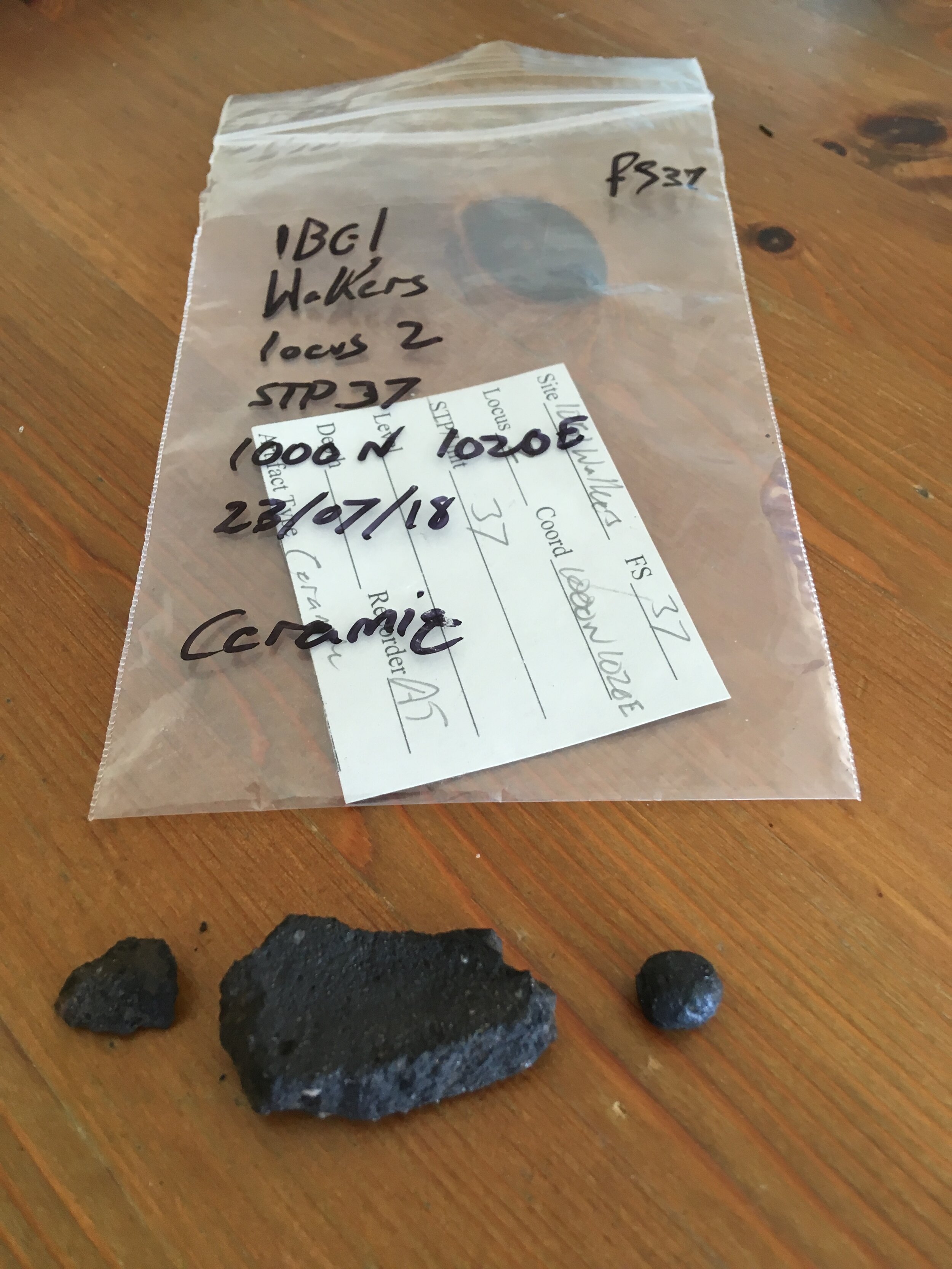
Unearthing Voices
For several years, I have been collaborating with archaeologist Dr. Matthew Reilly (CUNY, USA), on an interdisciplinary project called Unearthing Voices. This collaboration links archaeology, heritage studies, and contemporary art practice to explore the material heritage of Barbados as well as emerging responses of a community engaging with that heritage.
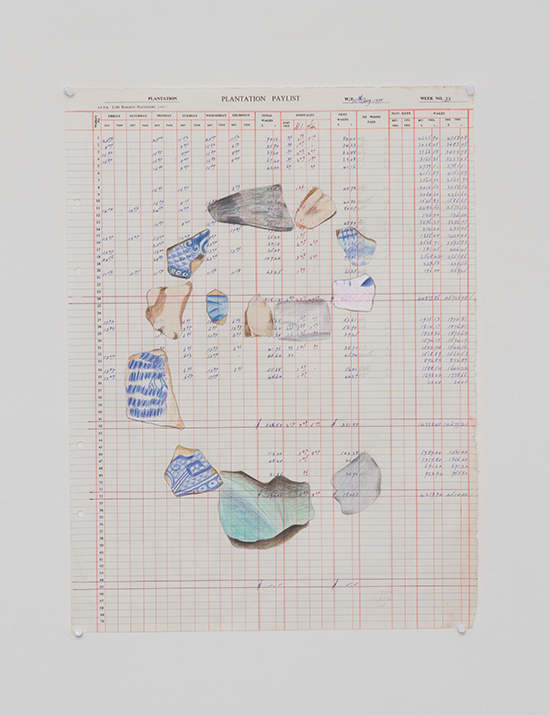
F is for Frances
The last will and testament of Thomas Applewhaite written in August 1816, directed that six years after his death his “little favourite Girl Slave named Frances shall be manumitted and set free from all and all manner of Servitude and slavery whatsoever.”

(bush) Tea Services
The tea service was made in collaboration with master potter Hamilton Wiltshire, using local red clay from the Scotland District on the East Coast of Barbados. Davis’ (bush) tea, was harvested from former sugarcane fields and rab lands from which she has served cerasee bush tea, bay leaf tea and blue vervain tea amongst others.

Sweeping the Fields
Sweeping the Fields is an act of remembering and of cleansing; a contemporary gesture to history’s groan which acknowledges the possibility of an emerging post-plantation apothecary. The action of sweeping, documented through a suite of photographs, developed out of my walking the fields on Walkers dairy farm in Barbados, where I live and work.
Self-recognition: The Shock of Seeing Yourself in the Mirror
Annalee Davis, co-organizer of Caribbean Linked III as the Director of the Fresh Milk Art Platform Inc. alongside Ateliers ’89 and ARC Magazine, reports from this year’s programme in Aruba. As a long-time dream of Davis’, the realization of a regional residency that offers a thriving environment for Caribbean artists to meet, bond and recognize themselves in one other across cultural and linguistic boundaries is a beautiful thing, but it also allows for serious contemplation on the issues our islands face, offering a chance to create meaningful work around these challenges.
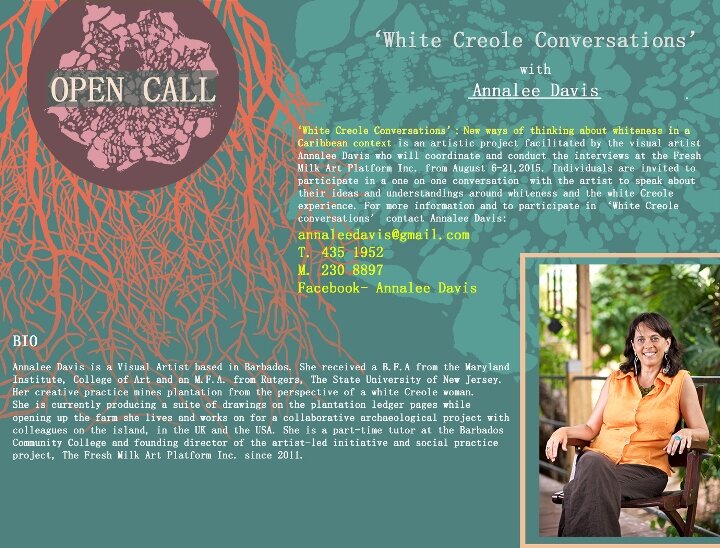
White Creole Conversations
The white Creole Caribbean voice has largely been silent or mis/understood in ways that suggest that the white community is monolithic, timeless, and homogenous. The context for this project is the small island of Barbados, where despite its diverse population, social life and kinship are predominantly lived in subtly separate racial spheres.
Stretching the Tropical
Annalee Davis was invited by Carla Acevedo-Yates and Cristiana Tejo as one of four contributors including Mario García Torres, Moacir dos Anjos and Leandro Nerefuh to respond to the provocation THE TROPICAL: RESISTANCE OR CULTURAL TOURISM?

Walkers - 1667 to present
What Davis seems to be invoking in the viewer is a kind of stereoscopic vision that simultaneously sees the skin of things and the bones beneath, the land and what lies below, history and what it hides.
Notions of common/wealth versus single/wealth
Global art is not only polycentric as a practice, but also demands a polyphonic discourse. Art history has divided the world, whereas the global age tends to restore unity on another level. Not only is the game different: it is also open to new participants who speak in many tongues and who differ in how they conceive of art in a local perspective. We are watching a new mapping of art worlds in the plural which claim geographic and cultural difference.

Unrecognised Affinities
The founding director of The Fresh Milk Art Platform Inc., Annalee Davis, was invited to participate in the 18th International Contemporary Art Festival Sesc_Videobrasil – 30 Years + Southern Panoramas in Sao Paulo, Brazil. The following is an edited version of her presentation ‘Unrecognised Affinities’ delivered at the panel titled ‘Hospitality and the Politics of Mobility’ on November 10, 2013.

Portraits of a White Creole Family
This work presents a portrait of a 21st century, white Creole Barbadian family. Twenty-five stands, cut from a single evergreen Ficus tree, are the support bases for posts which in turn each hold an acrylic, laser cut portrait of my immediate family members. The transparency of the material references the simultaneous visibility and invisibility of the twenty-five profiled white Creole portraits within the context of contemporary Caribbean society.